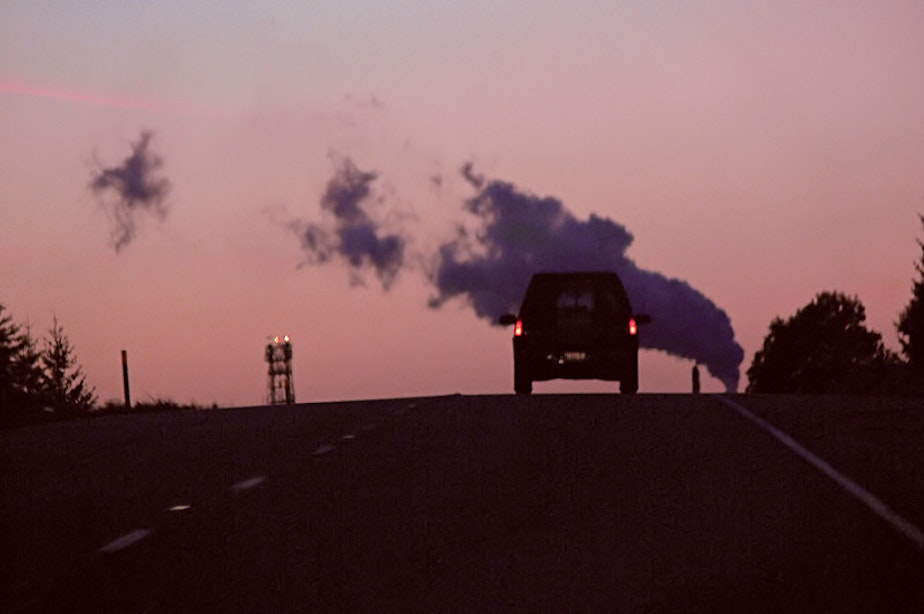Will Gov. Inslee's signature achievement live past his time in office?

After over a decade in office, Jay Inslee is nearing the end of his time as Washington’s governor. He signed his last set of bills last week.
But now, a signature piece of legislation, essentially the cherry on top of Inslee's gubernatorial career, is under threat as he exits the job. Voter Initiative 2117, spearheaded by Conservative activists, aims to repeal the state's carbon auction, the funding mechanism of Washington's Climate Commitment Act that was passed in 2021.
"This effort and this initiative is to allow an unlimited amount of pollution, to strip our children of the protection against this pollution," Gov. Inslee told Soundside's Libby Denkmann. "Most people talk about the financial aspect of this bill and ignore the fact that the most important thing this bill does is limit pollution."
RELATED: Republicans, Democrats, carbon, and you — Debating Washington's cap and trade
The carbon auction is now woven into much of the state's budget, particularly for funding green projects and transportation infrastructure. The initiative will appear on the November ballot and Washington voters will decide its fate.
The Climate Commitment Act requires big greenhouse gas-producing businesses, like oil and gas companies, to purchase credits (permission pollute a certain amount) to meet carbon reduction mandates. It's a form of a cap and trade system. So far, the auctions have raised a couple billion dollars. The first auctions raised considerable money, but prices plummeted at the most recent one.
Sponsored
The carbon auction has been blamed for higher gas prices in Washington state. Republican argue prices shot up after the auction went into effect. Democrats have argued that prices went higher because of seasonal ups and downs, as well as corporate price gouging.
Inslee said the initiative is an attempt by Republicans to allow unlimited pollution in Washington state.
"We should, and do now, have a limit on the amount of pollution that is causing asthma and respiratory distress, and massive forest fires and huge climate change," Inslee said. "This initiative would eliminate that protection for our children and our state."
Inslee noted that Washington also plans to link its carbon auction with California and Quebec. That would help reduce compliance costs, and keep cost of permits stable, he said.
RELATED: WA dems make the case to keep signature environmental law
About a year in, the price of carbon allowances in the auction has dropped significantly. The March 6 permit auction saw allowances going for a little under $26, roughly half the price of last year. But the sticker shock from those early, very expensive auctions seems to have damaged confidence in the system and opened the Climate Commitment Act to the repeal effort.
Sponsored
Inslee said those early high prices are the result of an unknown market.
"All we had to go on is the California markets. And our experience is a little different than California," he said. "I'm not shocked that when you start a new program, there are some fits and starts. But I think we are now in a more stable position."
The governor also argued that many people are missing the point of the carbon auction.
"The single most important thing that this bill does, something that people are trying to repeal because they frankly don't care about pollution in our kids' lungs ... this bill creates a limit, a cap ... on the amount of pollution that goes into our kids' lungs and also causes climate change," he said.
The money raised by the carbon auctions also gets cycled back into the state, Inslee noted.
"A huge, huge part of our transportation budget comes from the Climate Commitment Act," Inslee told Soundside. "Building transportation systems is now dependent on the Climate Commitment Act."
Sponsored
If the law was overturned, the state could see projects across the state stopped due to lack of funding, Inslee said.
RELATED: The future of Washington state's carbon auction may come down to gas prices
Inslee noted that the Climate Commitment Act is not the only way Washington tries to hold industries accountable. The state also has a clean-fuel standard, building-efficiency standards, and a first in the country heat-pump requirement.
"But we're not going to make it illegal tomorrow to drive a gas-powered car," he said. "This is a way to have a glide path towards that zero carbon economy that we have to get to in the next several decades."
With time, Inslee said, he expects the cap on pollution to decline, and fewer permits to be auctioned, as the state slowly heads towards zero emissions.
"But it is a glide path, not a cliff," he said.





